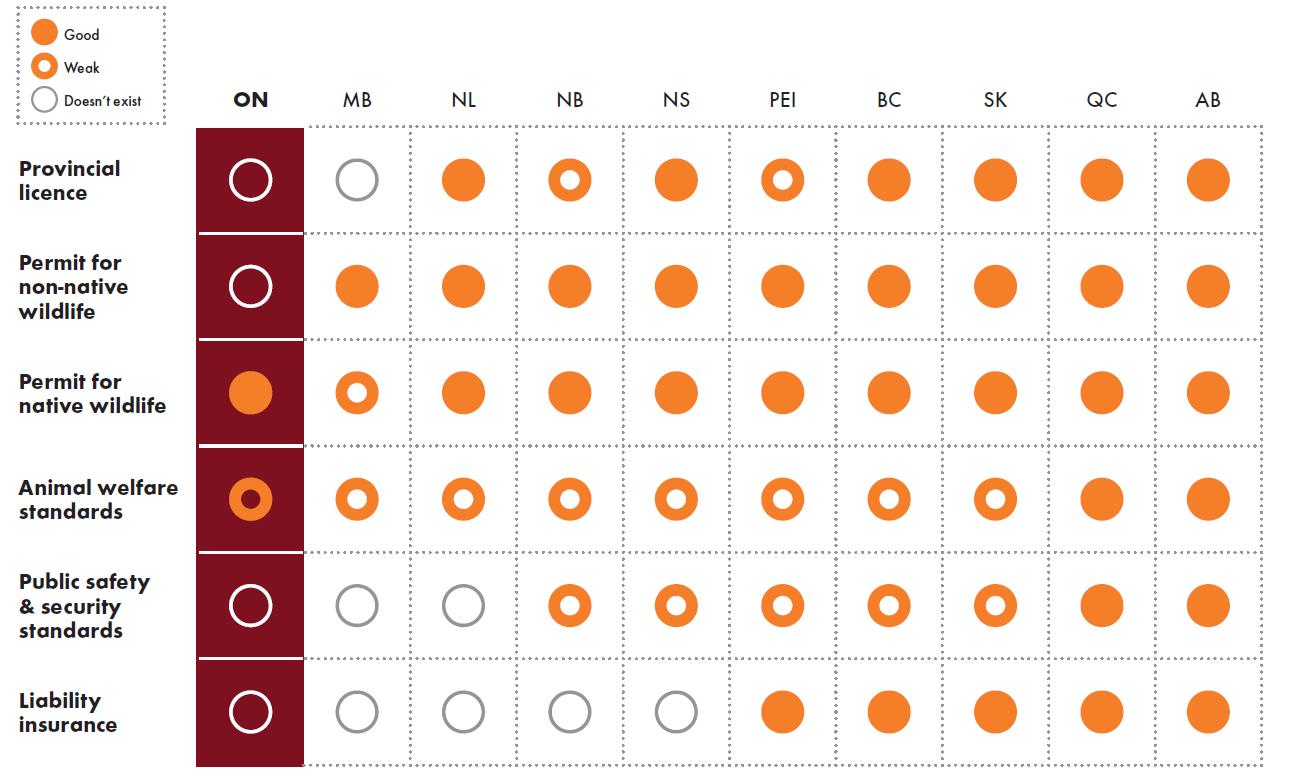Briefing note: Ontario’s roadside zoos
Background
With approximately 50 zoos, wildlife displays, and zoo-type exhibits housing wild animals, many of which can be classified as roadside zoos, Ontario has the most captive wildlife operations in all of Canada This province is the only major jurisdiction that has not yet comprehensively addressed issues related to the keeping of wild animals, whether it is for pets or for zoos. Instead, this responsibility has been downloaded to municipalities, which often lack the expertise and/or resources to deal with captive (and often dangerous) wild animals. Additionally, the current existing regulations that are supposed to safeguard the health and wellbeing of captive wildlife and the public are not working.1 We would like to see the province take ownership and resolve this longstanding issue.
Provincial responsibilities
There are two Ontario ministries with authority to regulate the keeping of wild animals
The Ministry of Natural Resources and Forestry (MNRF) issues licences for keeping certain native wildlife in captivity through regulations under the Fish and Wildlife Conservation Act. Very few conditions are attached to these licences and there are no required minimum qualifications, such as professional training in the humane and safe caretaking of these animals.
The Ministry of the Solicitor General (SOLGEN) is responsible for the welfare of all captive wildlife (native and exotic) through the Standards of Care and Administrative Requirements under the Provincial Animal Welfare Services (PAWS) Act. Animal care provisions are vague and have shown to be unenforceable, and there are no prescribed minimum safety standards.
To this day, the province has not regulated the keeping or the use of exotic wild animals for display purposes (i.e., zoos). Lions, tigers, monkeys, parrots, snakes, etc., can be kept and displayed in the province without restrictions, unless a municipality has a bylaw preventing this. Ontario is the only major jurisdiction in Canada that hasn’t regulated this issue at provincial level (see attached score card).
1 https://www.worldanimalprotection.ca/sites/default/files/media/WAP_Roadside_Zoo_Report_FINAL_092322_LR_1.pdf (World Animal Protection, 2022)
Impact on Municipalities
• In Ontario, between 1,000 and 2,000 wild animals are currently kept at roadside zoos and tens of thousands more are being kept in private homes.2 In many cases, the exact location of these wild and potentially dangerous animals is unknown, presenting a safety concern for neighbours, firefighters, police, by-law enforcement officers, and other first responders.
• In addition to public safety and animal welfare issues, poorly run facilities can be a community nuisance contributing to odour, noise and other problems, which can result in a decrease in property value of adjacent properties and ultimately impact the municipal tax base.
• Captive wildlife related issues can overburden already stretched municipal services – animal control staff may have to catch escaped animals, find homes for surplus or abandoned animals, and respond to noise and other complaints.
• Retroactively closing facilities or stopping exotic animal owners from bringing their animals into municipalities causes significant pressures on municipal legal staff and other departments, on financial resources, and can lead to significant unrest within communities.
• Municipalities that have bylaws in place are increasingly facing challenges from unregulated zoo-type facilities and wild animal owners who have sought bylaw exemptions or have attempted to open zoo-type facilities and bring in prohibited wild animal species despite existing bylaws.
Resolution
World Animal Protection is asking municipalities to support and adopt the resolution to urge the Ontario government to stop downloading responsibilities to municipalities. Instead, the Ontario government should restrict the possession, breeding, and use of non-native (“exotic”) wild animals and license zoos to support municipalities and guarantee the fair and consistent application of policy for the safety of Ontario’s citizens and the captive wild animal population.
Our campaign has been supported by major municipal associations such as AMO, AMCTO, and MLEOA.
Contact details
Erin Ryan, Wildlife Campaign Manager, ErinRyan@worldanimalprotection.ca
2 Risky Business, the unregulated exotic pet trade in Canada (World Animal Protection, 2019)

